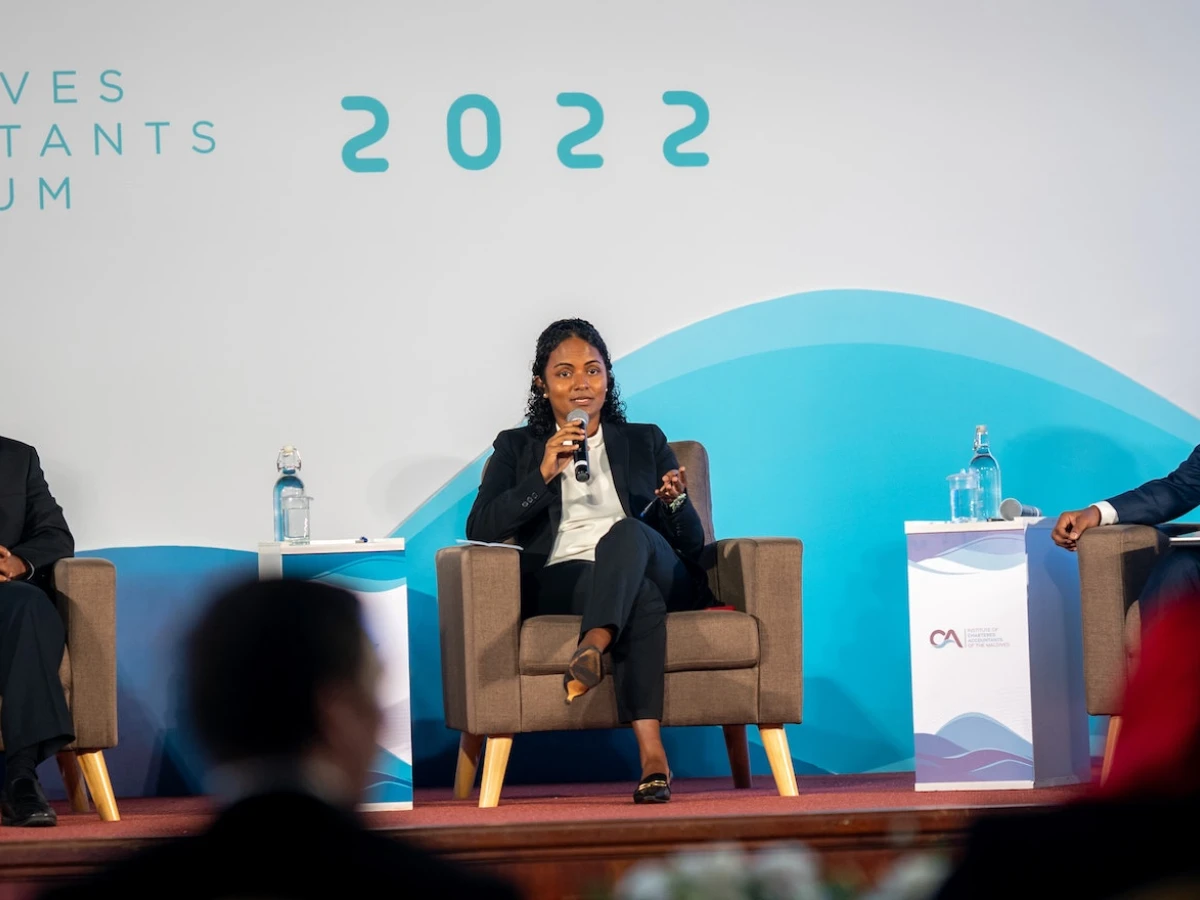
Need to implement blue economy strategies to combat climate change: Shauna
By
Ahmed Mizyal
Environment minister Aiminath Shauna said on Sunday that major problems in the country like land scarcity should be addressed through the blue economy strategy for which modern technology can be used.
A panel discussion titled 'Sustainability and Blue Economy' was held on Sunday as part of the ongoing Maldives Accountants Forum (MAF) for accounting professionals in the Maldives.
The panel discussion, moderated by Mohamed Inaz, Director for Climate Change and Sustainable at FJS Consulting, included:
-
Environment minister Aiminath Shauna
-
Ali Shareef, deputy chief of USAID Climate Adaptation Project
During the panel discussion, Shauna pointed out that the wealth of Maldives is based not only on goods, services and income sources on land, but also on ocean resources.
Shauna said the country was running out of ocean resources. In her speech, she highlighted the damage caused to the coral reefs by climate change and other issues.
The minister's speech highlighted the benefits of investing in the blue economy. With space constraints and growing demand for land acquisition, Shauna said that things can be done in preparation for the impact of climate change rather than reclaiming more land.
"There is already a lot of debate going on. For example, how can we make seafood [the seafood used in the tourism sector is usually imported from foreign countries]," she said.
"How to use natural [marine] resources to generate energy. For example, ocean currents and ocean thermal energy. How to generate clean energy through long term investments. How to use lagoon space to install floating solar panels."
The minister said that while most of the food items consumed by Maldivians are imported from abroad, some countries are using innovative tools such as vertical farming in food production to address the global food security problem.
"The problem is not the lack of technology. We have technology. Being a small country can also be useful; such new innovations can be used here as a laboratory, to test new technologies", she said.
'Development projects need to be climate-proof'
Giving credence to the minister's statement, Ali Shareef, deputy chief of USAID Climate Adaptation Project, said land acquisition is increasing as the population increases.
"It is developing very fast... Land acquisition has increased significantly. [In addition], there has been an increase in the amount of damage to reefs and oceans. The negative impact of these developments may not be visible now," he said.
The problem is not the lack of technology. We have technology. Being a small country can also be useful; such new innovations can be used here as a laboratory, to test new technologies.
According to Shareef, the modern world is paying for the detrimental effects of the industrial era, things mankind propagated in the past.
"At that time, they didn't have the kind of sustainability principles that we are following today. They wanted to make sky high investments, the way it was. What we are trying to do now is to combat global warming, and reduce it," he said.
'Real wealth of oceans may not have been acquired yet'
Responding to a query by the panel's moderator on whether the estimated value of the resources in the country's oceans has been achieved, state environment minister Abdulla Naseer said that the oceans have no boundary.
Pointing out that in the past, major global companies had tried to extract oil from the country's oceans, Naseer said that resources that have not yet been acquired can also be located within the country's oceans.
"We Maldivians are living on the top of the mountains. These mountains are about 2,000 kilometres deep," he said.
"Now the resources we have been able to use from the oceans are really limited. If you're looking to extract oil, we have to go beyond that. For example, to get fuel, you need to go 2,000 km beyond the depth of the 2,000 km depth of mountain. But that's not an easy thing to do with existing resources."
Since 2017, the MAF has aimed to train and promote the field of accounting via their annual event. Thus:
-
This year's theme is 'Economic Transformation, Rethinking Growth in the New Economy'
-
It will highlight various challenges in industries, including tourism, transportation, sustainable financial management, fisheries and others
-
Technical sessions and panel discussions will be held involving international professional accounting organisations and prominent people working in the field of accounting in the Maldives
More than 250 people participated in MAF 2022.
Related
Related

Audit finds MVR 930 million in uncollected environmental fines

Minister says limited capacity to monitor all dredgers

Thoriq says tree removal sometimes required for development

